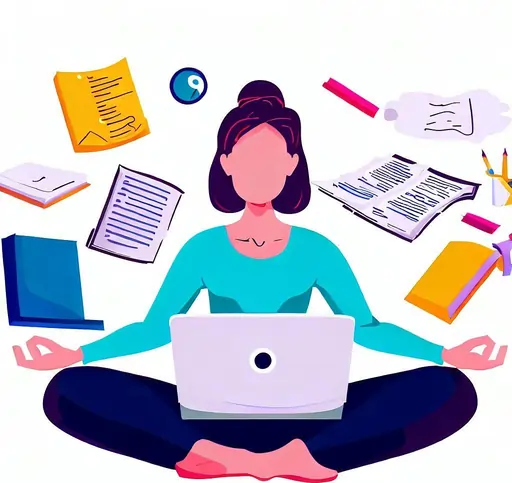The Role of Meditation in Exam Stress Management

Understanding Exam Stress
Exam stress is a natural response to the anticipation of challenges and the desire to succeed academically. It manifests through various symptoms such as increased heart rate, restlessness, difficulty concentrating, irritability, and even physical discomfort. Long periods of sustained stress can lead to burnout, affecting both mental and physical health.

The Science Behind Meditation
Meditation is an ancient practice that involves training the mind to focus and achieve a state of deep relaxation. Scientific research has shown that meditation has numerous benefits for mental health, including reducing stress and anxiety. Meditation triggers the relaxation response, which counteracts the body's stress response and promotes a sense of calm and well-being. Through regular practice, meditation can even lead to long-term changes in brain structure and function, enhancing emotional regulation and attention control.
Meditation's Role in Managing Exam Stress
Meditation plays a pivotal role in managing exam stress by providing effective tools for relaxation, heightened focus, and emotional regulation. Through mindfulness practices and deep breathing techniques, students can alleviate anxiety, improve their cognitive abilities, and cultivate a positive mindset, ultimately leading to better exam performance and overall well-being.
- Stress Reduction: One of the primary benefits of meditation is stress reduction. By engaging in meditation techniques such as deep breathing, progressive muscle relaxation, and mindfulness, students can lower their stress levels and create a sense of inner peace. These practices help in quieting the mind and reducing the mental chatter that often fuels exam-related worries.
- Enhanced Focus and Concentration: Meditation trains the mind to stay present in the moment, improving focus and concentration. This skill is invaluable during exam preparation and actual test-taking situations. With increased concentration, students can absorb information more effectively and perform better under pressure.
- Emotional Regulation: Exams can evoke a range of emotions, from fear and anxiety to frustration and self-doubt. Meditation equips students with the ability to observe their emotions without being overwhelmed by them. By cultivating emotional resilience, students can approach exams with a calmer and more composed mindset.
- Boosted Cognitive Function: Meditation has been linked to improved cognitive function, including memory and problem-solving skills. These cognitive enhancements can directly impact a student's ability to recall information during exams and to analyze complex questions.
- Positive Self-Image: Self-confidence often takes a hit during periods of intense stress. Regular meditation practice encourages self-compassion and self-awareness, leading to a more positive self-image. When students believe in their abilities and value their efforts, they approach exams with a healthier attitude.
Practical Meditation Techniques for Exam Stress Management
Practical meditation techniques offer actionable strategies to combat exam stress. Mindfulness meditation helps students stay present and reduce overthinking, while deep breathing exercises activate the body's relaxation response. Incorporating visualization and progressive muscle relaxation further empowers students to release tension, enhance concentration, and approach exams with a clearer, more composed mindset.
- Mindfulness Meditation: This practice encourages individuals to be fully present in the moment, observing their thoughts, emotions, and sensations without judgment. By cultivating self-awareness and detaching from negative thought patterns, mindfulness meditation becomes a powerful tool for managing stress, as it breaks the cycle of rumination and fosters a healthier relationship with one's thoughts.
- Breathing Exercises: Deep breathing techniques like diaphragmatic breathing and the 4-7-8 technique induce a state of relaxation by engaging the parasympathetic nervous system. These exercises effectively counter the body's stress response, reducing anxiety levels and promoting a sense of calm. The increased oxygen intake through deep breathing further supports cognitive function, aiding in clearer thinking and decision-making during exams.
- Progressive Muscle Relaxation: Through this method, individuals sequentially tense and then release muscle groups, dissipating physical tension. Progressive muscle relaxation not only eases muscle tightness caused by stress but also contributes to a general feeling of comfort and relaxation throughout the body. This technique is especially beneficial in combating the physical manifestations of stress, which often contribute to mental unease.
- Visualization: Guided imagery or visualization meditation involves creating vivid mental images of serene and peaceful scenes. By redirecting the mind's focus away from exam-related stressors and toward calming scenarios, individuals can effectively reduce anxiety and create a mental oasis. Visualization fosters a positive mindset and serves as a mental escape during challenging moments, ultimately enhancing mental resilience.
- Body Scan Meditation: This practice involves directing attention to different parts of the body, facilitating a heightened sense of awareness and relaxation. Body scan meditation aids in grounding individuals in the present moment, reducing racing thoughts and promoting mindfulness. By systematically exploring bodily sensations, students can gain a deeper understanding of the mind-body connection and alleviate tension during high-stress periods.
Incorporating Meditation into Your Routine
Incorporating meditation into your daily routine requires dedication and consistency. Start by setting aside a few minutes each day for meditation, gradually increasing the duration as you become more comfortable. Whether it's during study breaks, mornings, or evenings, finding a quiet and comfortable space will help you establish a calming meditation practice that complements your exam preparation and overall well-being. Here's how to get started:
- Set Aside Time: Start by dedicating a few minutes each day to meditation. As you become more accustomed to the practice, gradually extend the duration to allow for deeper relaxation and focus. By starting small and gradually building up, you create a sustainable routine that can be seamlessly integrated into your daily schedule.
- Find a Quiet Space: Seek out a tranquil environment where you can meditate without distractions. Whether it's a peaceful corner of your room, a nearby park, or any serene setting, the absence of interruptions will enhance your meditation experience, allowing you to fully engage with the practice.
- Choose a Technique: Embrace variety by exploring different meditation techniques. Try mindfulness, deep breathing, visualization, or body scan meditation to discover which resonates best with your preferences and needs. Recognize that everyone's meditation journey is unique, so feel free to experiment and find what suits you best.
- Be Patient and Consistent: Just like any skill, meditation requires patience and practice. If your thoughts wander during meditation, gently guide your focus back to your chosen point of concentration. Over time, you'll notice improved focus and mindfulness. Consistency is key, so commit to your practice even on days when it feels challenging.
- Integrate Meditation into Study Breaks: During intensive study sessions, incorporate short meditation breaks to refresh your mind. These brief moments of meditation provide mental clarity, reduce stress, and prevent burnout. By nurturing your mental well-being through these breaks, you enhance overall productivity and maintain a healthier balance between studying and self-care.
Conclusion
In the fast-paced world of academics, managing exam stress is a crucial skill that can significantly impact a student's performance and well-being. Meditation, with its ability to reduce stress, enhance focus, and promote emotional resilience, offers an effective and accessible means of achieving this balance. By incorporating meditation techniques into your daily routine, you can equip yourself with the tools to navigate exam stress with a calm and composed mind. Remember that your mental and emotional health is just as important as your academic achievements, and meditation can be a valuable ally in achieving both.